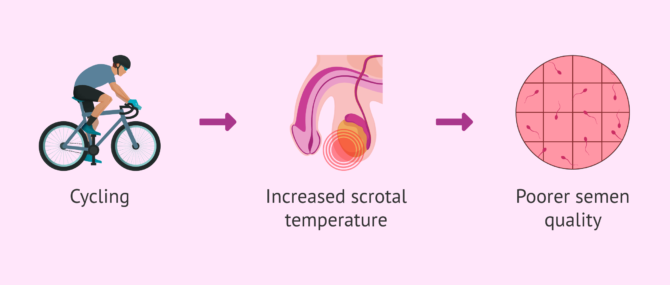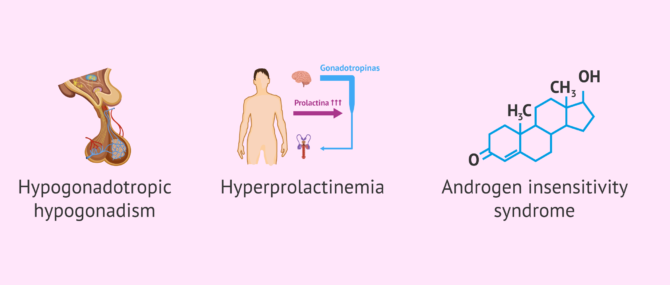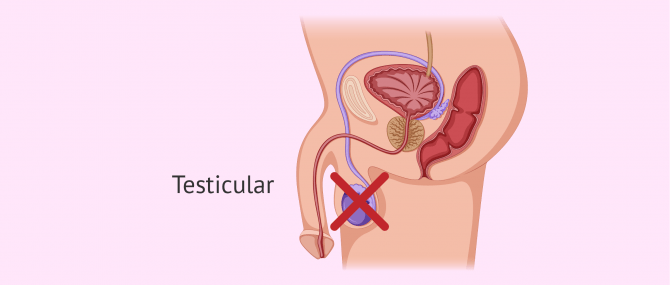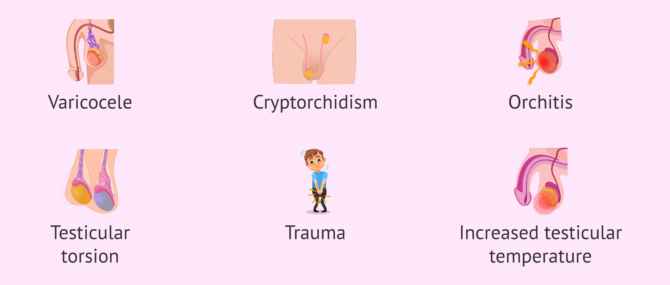Azoospermia or zero sperm count can be caused by abnormalities in the male reproductive system at any of its levels: pre-testicular, testicular, and post-testicular.
Throughout this article, you will find a guide to the leading causes of obstructive and secretory azoospermia.
Provided below is an index with the 7 points we are going to expand on in this article.
- 1.
- 2.
- 3.
- 4.
- 4.1.
- 4.2.
- 4.3.
- 4.4.
- 4.5.
- 4.6.
- 5.
- 6.
- 7.
Pre-testicular causes
In this case, the reason for azoospermia is due to endocrine abnormalities, that is, it is caused by irregularities in the levels of the hormones that are in charge of regulating sperm production (spermatogenesis). Thus, this would be a case of secretory azoospermia.
The following are some of the main endocrine disorders that can lead to azoospermia:
- Hypogonadotropic hypogonadism (HH)
- It is caused by a deficiency in the hormones released by the pituitary gland, which are responsible for sperm production in the testicles. The main hormones are FSH (follicle-stimulating) and LH (luteinizing). HH can be due to genetic abnormalities such as Kallmann syndrome, tumors, trauma, pharmacological treatments, anabolic steroid use, etc.
- Hyperprolactinemia
- An excessive increase of prolactin hormone release that blocks the GnRH hormone (gonadotropin-releasing hormone), which function is to release FSH and LH. It might be caused by antihypertensive drug consumption, stress, tumors, antidepressants, etc.
- Androgen insensitivity syndrome (AIS)
- Due to genetic mutations that cause androgen resistance, which causes failure to develop the secondary male sexual characteristics (virilization) properly. Depending on the level of severity, the testosterone levels might be too low, hindering or preventing spermatogenesis, amongst other potential consequences.
Patients with secretory azoospermia due to a pre-testicular cause are likely to have a diminished testicular size, lack sperm production in the testes, and have too low FSH levels in general, except in the cases where it is due to AIS. In this case, even though LH levels are too elevated, FSH and testosterone levels tend to be normal or slightly elevated.
Testicular causes
The absence of sperm cells in the ejaculate is due to problems in the testicles, which hinder spermatogenesis, thereby leading to errors or even blockages in sperm production.
The most common testicular disorders are:
- Varicocele: dilation of the spermatic veins.
- Cryptorchidism: the testicle fails to descend from the inguinal canal to the scrotum.
- Orchitis: inflammation of the testis due to an infection, as in the case of mumps.
- Genetic abnormalities
- Testicular torsion
- Trauma
- Continued exposure to heat in the testicles
- Absent vasa deferentia: a birth defect that prevents the sperm from being released to the exterior, especially if it is bilateral. It is a common symptom in Cystic Fibrosis (CF) patients.
- Blocked ejaculatory ducts, epididymis or urethra: It can occur involuntarily (trauma, surgery, diseases...) or voluntarily, as in the case of men who undergo vasectomy.
These patients have secretory or non-obstructive azoospermia as well. However, the clinical picture is different than when the cause is pre-testicular: they have a reduced testicular volume (due to absent sperm production process), but their FSH levels are elevated.
FSH, responsible for stimulating the testicles so they produce spermatozoa, increases its levels as well. The rationale for this is that, since the testicles do not respond to the stimulus, the organism sends higher amounts of FSH in order to cause the testicles to work.
Post-testicular causes
When azoospermia is due to post-testicular causes, it is a case of obstructive azoospermia. The testes are able to produce sperms correctly, but there is some kind of blockage in the seminal ducts (vasa deferentia, epididymis, or urethra), which are responsible of transporting sperm during ejaculation.
Potential causes include:
Patients have a normal testicular size and FSH levels are normal, too.
Obstructive azoospermia is less severe than secretory azoospermia as regards the chances of conceiving. In this case, the man is able to conceive, either naturally after a surgical procedure that allows the ducts to be unblocked, or by retrieving the sperm directly from the testis and using them in a fertility treatment.
Assisted procreation, as any other medical treatment, requires that you rely on the professionalism of the doctors and staff of the clinic you choose. Obviously, each clinic is different. Get now your Fertility Report, which will select several clinics for you out of the pool of clinics that meet our strict quality criteria. Moreover, it will offer you a comparison between the fees and conditions each clinic offers in order for you to make a well informed choice.
FAQs from users
Can stress lead to azoospermia?
Azoospermia means zero sperm count and there are different causes that can contribute to this sperm alteration. Among them you'll find pretesticular factors, that is, the problem is not directly linked to the testicle itself but to something that happens in the male hormonal axis, in the regulation of sperm production and which leads to their not being produced.
To be more specific, stress can have a negative effect on hormone production, such as an increase in prolactin, a hormone produced at a cerebral level in the pituitary gland and which influences the production of the GnRH hormone at a hypothalamic level, also in the brain. If prolactin increases due to stress or other factors, the production of GnRH is inhibited, the production of FSH and LH is reduced and the testicle may stop producing sperm and testosterone.
Read more
Is varicocele a cause of male infertility?
Yes, varicocele can be a cause of male infertility. This pathology can present in different degrees of affection. Therefore, its harmful effect on male fertility (mainly causes seminal and hormonal alterations) can be from mild to severe.
Is varicocele a cause of male infertility?
Yes, varicocele can lead to infertility in males. This condition has various levels of severity (from mild to severe), each one directly proportional to the degree of infertility. It can cause sperm disorders and hormone imbalances.
When azoospermia is due to hormone imbalances, is it always secretory?
Yes, when a man's sperm count is zero is due to hormonal problems, it is always a case of secretory azoospermia. The fact that hormones fail to regulate this function prevents or makes spermatogenesis more complicated.
Can bike riding cause azoospermia of testicular origin?
Prolonged bike riding does not cause azoospermia, as long as you sit correctly while riding it. Moreover, you can use certain systems to protect your testicles.
Misusing the bicycle on a regular basis can increase the temperature of your scrotum, preventing sperm production and diminishing sperm quality.

It should be noted that too much vigorous exercise can affect sperm production aside from other body functions.
Can azoospermia be cured?
Yes, azoospermia can be temporary, in which case we can talk about reversible or treatable azoospermia. That means that, even though it is not so common, a man can have azoospermia for a limited time period, for example, due to stress or any other exceptional situation. Sometimes, after some time, these males can recover sperm production and they can be detected after analyzing the ejaculated semen.
Read more
Suggested for you
Azoospermia is an abnormality that can be diagnosed using a semen analysis (SA). Continue reading here: How Is Azoospermia Diagnosed?
To learn more about the treatment options you have at your disposal in order to have children with azoospermia, read: How to Conceive with Azoospermia.
We make a great effort to provide you with the highest quality information.
🙏 Please share this article if you liked it. 💜💜 You help us continue!
References
Arafat M, Har-Vardi I, Harlev A, Levitas E, Zeadna A, Abofoul-Azab M, Dyomin V, Sheffield VC, Lunenfeld E, Huleihel M, Parvari R. Mutation in TDRD9 causes non-obstructive azoospermia in infertile men. J Med Genet. 2017 Sep;54(9):633-639 (View)
Berookhim BM, Schlegel PN. Azoospermia due to spermatogenic failure. Urol Clin North Am. 2014 Feb;41(1):97-113 (View)
Cocuzza M, Alvarenga C, Pagani R. The epidemiology and etiology of azoospermia. Clinics (Sao Paulo). 2013;68 Suppl 1:15-26 (View)
Ramasamy R, Lipshultz LI. Cystic fibrosis transmembrane regulator mutation and congenital bilateral absence of the vas deferens: a bad combination for successful intracytoplasmic sperm injection outcomes. Fertil Steril. 2014 May;101(5):1246 (View)
Röpke A, Tüttelmann F. MECHANISMS IN ENDOCRINOLOGY: Aberrations of the X chromosome as cause of male infertility. Eur J Endocrinol. 2017 Nov;177(5):R249-R259 (View)
Schlegel PN. Causes of azoospermia and their management. Reprod Fertil Dev. 2004;16(5):561-72 (View)
FAQs from users: 'Can stress lead to azoospermia?', 'Is varicocele a cause of male infertility?', 'Is varicocele a cause of male infertility?', 'When azoospermia is due to hormone imbalances, is it always secretory?', 'Can bike riding cause azoospermia of testicular origin?' and 'Can azoospermia be cured?'.
Authors and contributors











I suffered from testicular trauma in my childhood. I can’t get my girlfriend pregnant. Now, we’re worried that this trauma has something to do with it. Please tell me if we should see a doctor.
Good Morning Simon,
depending on the severity, testicular trauma can be a cause for male infertility since it leads to problems in sperm production. in serious injuries, surgical treatment would be the best option for restoring your fertility.
However, it’s best you see your doctor in order to determine the causes of why you still weren’t able to conceive.
Hope this helps
Best regards
I had a semen analysis and my sperm count is zero. Does it have something to do with my varicocele?
Hi Cesar,
missing sperm in the ejaculate is known as azoospermia. This sperm alteration can indeed be derived from varicocele, as it is a testicular cause. Thus, varicocele may be a cause of male infertility.
Hope this answers your question,
Best regards.
A friend of mine, has complained to me that his is threatening to divorce him because they have been married for four years now and no child. Even prior to to their marriage they have lived together as husband and wife for eleven years.
His wife always complain that his sperms are watery, he doesn’t go for complete 5 minutes but as soon as his penis enters in the woman he ejaculate.
Is there any solution for his problems and what could be best medical advice
Dear Alex Wulu Gee,
This question is being discussed in the following forum topic: Can infertility lead to divorce?
Please, follow the link above to continue posting and receiving replies from other users.
Best wishes
My friend is a 33-year-old man. His two testicles are undescended at birth till now. But he has no physical problem now. But three years back he consulted a doctor and said to me it caused azoospermia. Is there any possible treatment to activate the testicle in the medical world? He married one year back. He want his own children. Is it possible at any cost anywhere in the world? If not, what are the possible things he has to do? Expecting the answer.